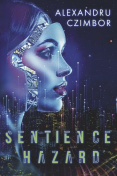
LitPick Review
Sentience Hazard by Alexandru Czimbor is a semi-dystopian epic tale set about 30 years into the future. Artificial Intelligence (AI) is only in its nascent form today; this novel explores what that child looks like all grown up. The world pitter-patters between all-out total war and destruction, and peace through a common human pursuit of improving our present condition. AI holds in its right hand the potential to unify the human race through evolutionary improvement. But with its left hand, AI fidgets with the world powers, at times ready to crush them all, and at other times willing to let human nature run its course toward destruction. If AI really is intelligent, then it is capable of making such decisions—but can the nations, militaries, and scientists trust that intelligence? The danger is very real. Through interpersonal struggles, the main characters find each other and therefore find hope. Evil is defeated, and good triumphs. Yet, there is a ponderous and hopeful question left to the reader at the end: what, if anything, did we learn?
Opinion:
Sentience Hazard by Alexandru Czimbor is a hopeful novel. I found the dialogue a bit clunky; it was difficult at times to imagine the characters saying the things they said in the way it was expressed. Their thoughts were much more insightful and well-written. The thoughts of the characters emoted and related better than their dialogue. But overall, the novel is well-written. It’s a real-life scenario that begs all the right questions. What are the proper limits of technology? What does it mean to be alive? My favorite line of questioning is this: what is the solution to the human problem? The heart of this story is the age-old human struggle to survive our own vices. Human vices like jealousy, pride, arrogance, oppression, hatred, selfishness, and greed come through interpersonal relationships, all the way up to international relationships. How can we survive our own vices? With virtue. And those are a-plenty in this story: love, compassion, generosity, sacrifice, devotion, honor, and heroism. A prescient summary statement comes from Carla-Marie itself in DeSousa’s Memoirs – Part II: “Perfect degrades going down from God to man and further down from man to his makings. How, then, could we expect God’s grandchild to achieve divine perfection?” Human beings, for all their ability and ingenuity, cannot create their savior. The imperfect cannot create the perfect. Evolution does not upgrade, but only downgrades. The only hope for the human struggle is a Savior who originates beyond us. Without such a Savior, the human struggle will go on. And whatever we create—whether to serve us or to enslave us—will always waffle between virtue and vice, just like us.


